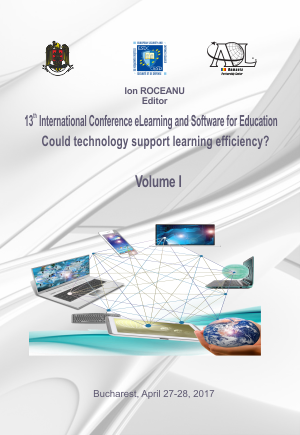THE PEDAGOGICAL EFFECTIVENESS OF BLENDED LEARNING IN HIGHER EDUCATION
THE PEDAGOGICAL EFFECTIVENESS OF BLENDED LEARNING IN HIGHER EDUCATION
Author(s): Gheorghe H. Popescu, Ana Maria Chisega NegrilaSubject(s): Social Sciences, Education, Higher Education
Published by: Carol I National Defence University Publishing House
Keywords: pedagogical effectiveness; blended learning; higher education; virtual communication; teaching presence.
Summary/Abstract: We rely on Vaughan et al. (2013) to prove that the transformative cutting edge of virtual communication and online learning communities generates novel manners for teachers and learners to participate, cooperate, and be instrumental in learning. The innovative learning setting, when associated with face-to-face reciprocal actions, demands relevant role alterations and the requirement to grasp the notion of teaching presence for inherent and valid learning outcomes. Information and communications technology supply the chance to constitute communities of individuals that back commitment and teamwork. To introduce empirical content to our theoretical model, we start with the finding that the teacher in a blended setting is collaboratively active in drawing up, furthering, and managing the didactic experience. Blended learning has acquired rising consideration with the incorporation of web-based technologies into the pedagogical process (the essence of blended learning is the assimilation of face-to-face and online learning undertakings). The key role of blended learning is to develop rationalization and communication across time and space. For¬ the¬ investigation of¬ the¬ formulated issues, we develop first-rate recent literature and agree that blended learning is particularly intended for improving commitment via the groundbreaking embracing of focused online learning undertakings, and its objective is to merge face-to-face concomitant interaction and text-based online nonsynchronous interaction to educationally stimulate learners in manners not conceivable via either mode separately. Blended learning maintains educational interaction in time, and learners have time to ponder and reply considerately. Learning communities supply the circumstances for debate, mediation, and compliance in face-to-face and online settings with infinite likelihoods to link to other individuals and to information. Our findings support our theoretical discussion and empirical analysis and are consistent with research highlighting that in a synergetic community of inquiry, education is established in focused inquiry and learners collaboratively take up joint accountability and control to conceive, further, and manage inquiry.
Journal: Conference proceedings of »eLearning and Software for Education« (eLSE)
- Issue Year: 13/2017
- Issue No: 01
- Page Range: 217-223
- Page Count: 7
- Language: English

